
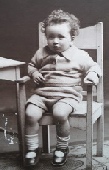
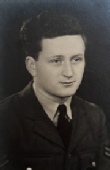
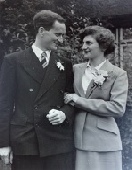
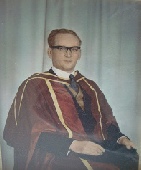
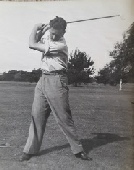
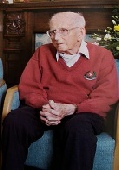
Ronald Basil Girdler
1925 -



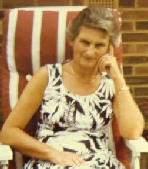
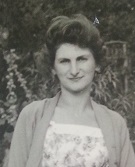
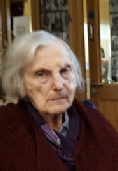
Helene Girdler
1927 -

My Childhood
When I was about a year old the family moved from Stepney to a house in Ranelagh Road, Leytonstone. Het, who was then about 14, took me on the bus to the new house to await the arrival of the furniture. She found that the water pipes were frozen, so, not having a bed or cot to put me in, she removed a drawer from the dresser and laid me in it whilst she thawed out the pipes by warming them with a candle. It took about an hour till the water finally came through. On another occasion whilst I was still a baby she and Kit fed me with pickled herring and pickled cucumber! I seem to have suffered no ill-
Dad's Mother, whom we knew as Booba, (Yiddish/Russian for Grandma), had arrived in England following the death of her husband. All four of her children had emigrated by that time; Dad and his younger brother Ike were in London, her only daughter Nellie (Nacha) was in Melbourne, Australia, and her youngest child Eugene lived in Paris. For a while Booba lived with Uncle Ike, later she remarried and lived in the East End. I remember very little of her as she died when I was about eight, but I do remember being taken to see her with Dad and I recall sitting on her bed (although she was up and about) and her talking to me in Yiddish of which I knew very little. She sat me on her lap and called me "Chaiashi", her pet name for me. Het remembers her most and recalls the occasion when Booba was visiting our house. Het was preparing a chicken for dinner as Mum was away, probably in Hospital following Shirley's birth. Booba was horrified to notice that Het, having removed the chicken liver, had placed it alongside the chicken and in contact with it. This was an offence against Jewish dietary laws, and she insisted that they go to the Rabbi to ask his advice on how to deal with the situation there and then, in spite of the fact that he lived some distance away. Het protested but to no avail, they had to go in case the Rabbi would give them instructions to destroy the bird, The Rabbi, however, merely told her not to do it again!
The news of Booba's death came by telephone, whilst I was playing on the piano and singing the latest Ginger Rogers and Fred Astaire hit "Dancing Cheek to Cheek". The phone was in the same room as the piano, and Dad told me to be quiet whilst he took the call. When he put the phone down he said "Booba's dead", and left the room. She died of cancer of the stomach. I was surprised that he didn't burst into tears! I continued playing and singing.
Whilst in Leytonstone, the older children often took the younger ones to Wanstead Flats, a large open space nearby which occasionally housed a Fairground. I can remember going there either in or with the pram in which we had placed a picnic, A horse which had been grazing there took a great interest in the pram and its contents and peered right into the pram. We were all terrified! On another occasion when I was a little older, Barbara took me to the Fair there, and we went on a roundabout in which we sat in a seat which itself revolved on its own axis, whilst all the cars revolved in a huge circle. I screamed and screamed to be allowed to get off but of course was unable to do so till our time was up. I have never been able to face a roundabout with equanimity since.
It was on one of these trips to Wanstead Flats when the older children noticed that John became very tired and could not walk and he had to be put in the pram with the baby, (me!). He was then about four years old. He was taken to Hospital and it was shortly after his return home when Mum noticed that he was limping, and it was discovered that he had a tuberculous hip joint. At first the doctor told Mum to buy him some shoes with a built-
When John was home from hospital, we used to play a lot together -
In Leytonstone Shirley and I attended Cann Hall Road school, but I remember very little of it and have only the annual school photographs to remind me of my time there. Two doors away from our house lived the Cousins family and Dennis who was about the same age, as he became my playmate. Leading from the front gate to the door of our house was a path constructed of black and red quarry tiles arranged in a geometrical pattern. Dennis and I spent very happy morning prising up as many tiles as we could before we were discovered. Denis's mother kept a small shop in her front room in which she sold a variety of items including penny bars of Cadbury's milk chocolate which we bought whenever we had a penny to spare. Mum bought a "Goblin" vacuum cleaner -
Our playground was the street, for very few people had cars, and certainly none in our street. In fact it was quite unusual to see a car, so it was notable when Dr Creston's car was parked in the road. He had a small open-
We did not celebrate Christmas in our family but I was once invited to a Christmas party at the Cousins' house, where I stood by the Christmas tree enthralled by the glass baubles. It was at this party where I first performed in public my "song and dance routine" which I had learned at school. I wore a pink frilly dress and spoke the line "this way, that way" whilst pointing alternate feet in the manner of a ballet dancer. Also we played "Postman's Knock" which I did not find at all amusing. Dennis's father, a Railwayman, offered me a sweet from a bag, and being the polite child that I was, I refused, to which he replied "all the more for me then" which I thought was quite offensive!
On the sixth of December 1934 the family moved again to 21, Ickburgh Road, Clapton. On the day of the move I sat on the dividing wall outside the house watching the removal men and I thought "I will remember this day for the rest of my life!" This house was much bigger than the previous one, and actually had a bathroom! The Leytonstone house had no bathroom and we used to take turns to have a bath in a big zinc bath in front of the kitchen range. The Clapton house was built on several floors with half-
Dad had a large workroom in the house where he, Het and an employee Connie, a machinist, used to work. Both Dad and Het would make the garments from beginning to end-
Mum and Dad would observe all the Jewish Holidays including Seider Nights at Passover when the family would gather round the table for the ritual meal, and on these occasions after John's Barmitzvah at thirteen, John would read the appropriate questions from the prayer book in Hebrew, and Dad would give the responses, Mum would also light the candles on Friday evenings at sunset, and the special candles in the branched candlesticks at Chanuka. All the adult members of the family used to fast for 24 hours on the Day of Atonement. In spite of all these religious observances we were not restricted on the Sabbath as orthodox Jews were, although writing was frowned upon, and I think that Dad only followed the rules because he felt that Mum wanted him to.
My first day at my new school in Northwold Road was memorable for the fact that the Headmistress showed me to my classroom, and as we walked across the polished parquet floor of the Hall she suddenly asked "What are nine fives?". I am amazed to recall that I was able to answer "45". One day when I was about eight, Dad came home with a little black and white puppy. Apparently he had met someone who had this puppy for sale and he bought it on the spur of the moment. The whole family were delighted, and we named her Blackie. We already had a black cat called Tibby, and I was not particularly interested in her, but I loved Blackie very much. At this time we had a series of live-
A visit from Uncle Isaac, Mum's brother, was anticipated with some delight, because he always gave us half-